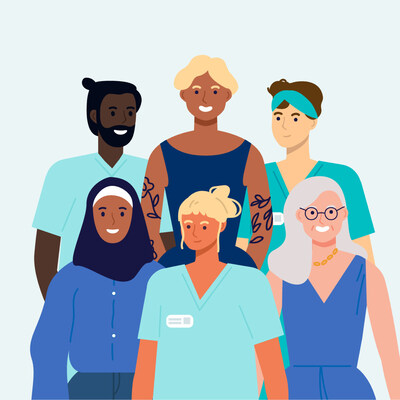Shedding light on bias and discrimination
CNO looks at nurses' workplace conditions to guide change
TORONTO, Oct. 16, 2025 /CNW/ - At CNO, we believe that just as every patient deserves access to safe and quality care, every nurse has the right to work in an environment rooted in equity, respect and inclusion.
Last year, we conducted our first-ever Workforce Census to help us and our health care system partners understand nurses' lived experiences and identities better. We heard from over 31,000 nurses and published the first set of findings about identity, practice and employment characteristics of nurses in the Demographics and Nursing Practice Report.
Now, CNO has developed a new resource on workplace inequities nurses face.
"Today, we are sharing a new set of information sheets on workplace inequities and barriers nurses face in their practice. These findings give a clearer picture of the day-to-day realities in nursing," said Brent Knowles, CNO's Director, Analytics & Research. "CNO will collaborate with our health system partners to inform them of our data-driven insights and help promote safer nursing practices for both nurses and Ontarians."
This work reflects our commitment to diversity, equity and inclusion (DEI) by using data to promote equity and shed light on bias and discrimination that exists within nursing. Our goal is to inform and guide sustainable change in workplace conditions for nurses, to ensure Ontarians continue receiving effective, safe and quality care.
Below we highlight our findings from the three information sheets that explore issues related to racism, ageism and gender-based discrimination. It's important to note that one of the survey tools we used was the Revised Everyday Discrimination Scale (r-EDS). The r-EDS is a set of questions that asks respondents to reflect on their day-to-day life experiences with unfair or discriminatory treatment.
Information sheet snapshot: Confronting racism
As part of the census, nurses were asked to respond to the following question about racism and discrimination: "Across academic, clinical or other professional settings, do you believe you have experienced racism or discrimination related to your identity?"
A total of 27,836 respondents answered this question, and 37% of them chose "yes" as their response. More specifically, 67% of racialized nurses who answered "yes" to this question self-identified as belonging to one of the following demographic groups: "Arab, Middle Eastern or West Asian," "Black," "East Asian," "Latin American," "South Asian," "Southeast Asian" or "Mixed (if the respondents selected one or more racial identities)." In our follow-up questions from r-EDS, it became clear that Black respondents experienced most frequent daily incidents of discrimination. Our findings also showed racialized nurses are often under-represented in leadership positions.
From insight to impact
Evidence suggests experiences of racism in the workplace can contribute to burnout and negatively impact the safety and wellbeing of both nurses and patients. A meta-analysis examined 85 nursing studies and found burnout was associated with adverse patient safety events (for example, more medication errors and hospital-acquired infections).
Information sheet snapshot: The hidden age bias
Our findings showed nurses between the ages of 18 and 24 frequently experienced everyday discrimination. When asked why respondents believed they had these experiences, about eight in 10 cited their age as a factor. Within this age bracket, 56% of nurses reported being treated by patients and/or their families with "less courtesy or respect," and 43% said they were "threatened or harassed" at least a few times per month.
In addition, 36% of respondents within this age group also reported being perceived as "not smart" by their co-workers or peers. Nurses who were 55 and older, expressed their feelings of being "devalued" despite their many years in nursing and feeling excluded from promotions and stable employment opportunities.
From insight to impact
As Ontario's population grows older, successfully retaining nurses across all age groups should be our collective focus. Establishing age-inclusive, flexible workplaces with career growth opportunities for all nurses is essential to building a resilient health system for the future.
Information sheet snapshot: Facing the reality of gender-based discrimination
According to the census, more than one in four respondents (26%) reported experiencing threats or harassment at least a few times per month from patients and/or their families. Nurses who identify as non-binary/gender non-conforming reported the most frequent experiences of threats and harassment (39% at least a few times per month). Analyzed by gender identity, they also reported the highest levels of racism and discrimination (72%), compared to experiences among men (55%) and women (35%). In open-ended responses about how gender impacts nursing practice:
- women expressed the nursing profession was female-dominated and, as such, "devalued" and "underpaid." There also was a general perception that their male colleagues progressed faster within their careers.
- men said they felt like they did not belong in nursing, which was attributed to widespread perception that women are a better fit for this profession. Men also stated there was a lack understanding and support related to specific issues male nurses face.
From insight to impact
Historically, the nursing profession has been predominantly female. However, we have observed a gradual shift in demographics within nursing. For example, the overall proportion of male nurses being represented within the profession grew from 7% to 10% during the past 10 years. Further, according to the 2021 federal census, the new generation of professionals (Generation Z) entering the workforce includes a higher proportion of individuals who self-identify as transgender or non-binary than any previous generation. That's why recognizing and supporting all nurses is essential to achieving a more equitable and inclusive workforce where everyone feels they belong.
"Our findings offer insights that aim to guide collective actions in promoting a safe and equitable health care system for both nurses and Ontarians," said Knowles. "Realizing this change will require collective resolve and responsibility in implementing clear policies that are firmly aligned with principles of diversity, equity and inclusion for all."
Read the information sheets now
SOURCE College of Nurses of Ontario



